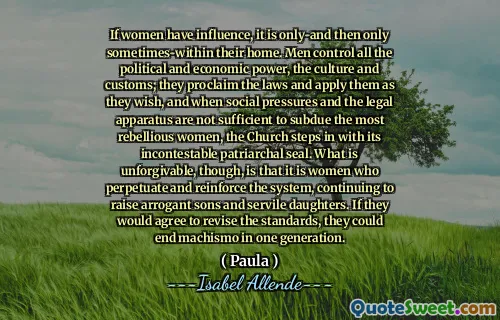
If women have influence, it is only-and then only sometimes-within their home. Men control all the political and economic power, the culture and customs; they proclaim the laws and apply them as they wish, and when social pressures and the legal apparatus are not sufficient to subdue the most rebellious women, the Church steps in with its incontestable patriarchal seal. What is unforgivable, though, is that it is women who perpetuate and reinforce the system, continuing to raise arrogant sons and servile daughters. If they would agree to revise the standards, they could end machismo in one generation.
This powerful quote underscores the deeply entrenched nature of patriarchy in society and the complexity of gender roles within it. It highlights how political, economic, and cultural power overwhelmingly lies in male hands, creating systemic structures that perpetuate male dominance. The mention of the Church as an institution that enforces patriarchal values speaks to the multifaceted nature of oppression, where religious and social systems intertwine to regulate and suppress dissenting women. Of particular note is the critique of women who internalize and uphold these oppressive frameworks, raising children who continue to embody gendered expectations—the "arrogant sons" embodying machismo and the "servile daughters" perpetuating subservience.
This reflection invites readers to consider the nuances of power, complicity, and change within gender dynamics. It is not merely external forces that sustain patriarchy but also the socialization processes within families and communities that reproduce harmful standards. The call to action here is clear: a concerted effort by women to challenge and revise these ingrained standards could dismantle machismo rapidly across society. It positions change as achievable yet dependent on conscious shifts not just in political or legal realms but within domestic spheres as well. The quote encourages us to acknowledge our roles in either perpetuating or transforming cultural narratives and recognizes the remarkable potential for generational change if society confronts these issues honestly.








